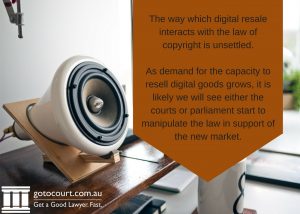Can I Resell Digital Goods?
When we buy products as a consumer, we can be secure in the knowledge that if we no longer want them, want to upgrade to better things or change our minds, there is generally a market in which to resell them. Whether it be through Amazon, Gumtree, or eBay we have second-hand markets for almost everything.
What do we do, though, with our digital purchases like old movie files, iTunes purchases, or eBooks we have read too many times? Can we resell our digital goods?
What is digital resale?
Digital resale is the process of selling pre-owned products that exist only in their digital format and it is an area of consumer and copyright law that is quickly transforming.
When we buy pre-owned music and movie discs from the thrift store, no one questions the legality behind doing so. But it is not quite as clear when we are dealing with digital goods.
Online marketplaces are becoming the primary means of purchasing and the way in which they operate changes rapidly as technology advances. A new market is beginning to emerge which allows people to resell their digital goods. It has caught the attention of digital giants like Amazon and Apple, as well as the tech world, the entertainment industry, and now the public.
Is digital resale legal?
In 2013, judgment was handed down in the Southern District Court of New York in a case that addressed the novel questions surrounding digital resale.

The case concerned start-up ReDigi, the first online digital store for pre-owned digital music. Capitol Records LLC brought the case to court claiming ReDigi had infringed its music copyright. ReDigi, which was founded in 2011 and created software allowing the public to purchase pre-own MP3s and to sell their old, legally downloaded songs.
The technology involved the upload of the MP3s to a cloud-based server which then would delete all copies of the file from the seller’s computer and other synchronised devices. After doing so, the pre-owned MP3 could be sold to another consumer at a cheaper price.
The court ruled in favour of Capitol Records LLC, agreeing that ReDigi had breached US copyright law and the rights of the copyright owner.
What will this mean for Australia?
The question of reselling digital goods has yet to be debated in Australia. However, it is likely that the ReDigi case will have a strong influence on Australian courts.
The Copyright Act 1968 governs copyright law in Australia. Digital resale is likely to infringe copyright under this Act in two ways:
- In relation to MP3s which are classified as sound recordings under the Act, resale would infringe the rights of the copyright owner by communicating the sound recording to the public; and
- Depending on the technology used when reselling digital goods, it may amount to the creation of a new copy of the MP3 file which is prohibited under the Act (per section 85).
Reselling digital goods may also breach contract law depending on the agreement made for the original purchase. When we buy songs from iTunes, for example, ticking the box agreeing to the terms and conditions means we have signed away our rights for resale. This is assuming the courts interpret digital resale as going beyond personal and non-commercial use.
However, the way in which digital resale interacts with the law of copyright is unsettled. As demand for the capacity to resell digital goods grows, it is likely we will see either the courts or parliament start to manipulate the law in support of the new market.
What would be the impact of allowing people to resell digital goods?
Copyright law is a way of protecting musicians, lyricists, artists, producers, designers, choreographers, authors, and others who create works that is enjoyed by the public. Copyright law does this by giving those who created or made the work exclusive rights to use and adapt it. Copyright is founded on a person’s creative abilities and effort, protecting innovation, investment, and creativity.
Copyright law involves balancing the rights of a creator against the public’s right to enjoy the work.
On one hand, the strict interpretation of copyright law and digital resale protects the entertainment industry. Unlike books and other physical items, digital files do not deteriorate and can be duplicated and manipulated. As files move rapidly, often across state or country borders, it makes regulation difficult and thus opens up the market to abuse. Copyright owners claim that changing the interpretation of Australian copyright law to allow digital resale would restrict creativity and would result in unfair economic consequences.
On the other hand, allowing digital resale also protects copyright owners and distributors from competition. In an increasingly consumerist society, competition is vital for growth. Second-hand markets make creative works more accessible and result in the product being available for consumption at a reduced price. There is also the argument for digital resale which provides these second-hand markets act as alternatives to piracy.
The right to resell digital goods is a balancing act. The law will eventually determine whether it is more important to protect the rights of the copyright owners or whether the rights of everyday people, the consumers, should prevail.
Is there a future for resale of digital goods?
Online marketplaces are the future of trade and it is likely that over the next few years there will be extensive legislative reform and litigation in the courts to address the legality of digital resale. ReDigi has already indicated that they will be appealing the court’s decision and will continue to alter and update their service to create new technologies not yet considered. The digital and entertainment world will be watching closely. Amazon and Apple are already taking steps to patent online mechanisms allowing customers to sell or transfer their digital goods.
The evolving nature of copyright law in the digital resale space requires reform of the current law to meet the needs of a digital age. As a consumer, one can only imagine how much wealth is sitting on our phones, computers and tablets.
This article is an edited version of the second place entry in the 2016 Australian Legal Writing Challenge. The original article was written by Caroline Foley and was titled ‘The Untapped Wealth Inside Your iTunes Account’. You can read the full article on our Writing Challenge page.








